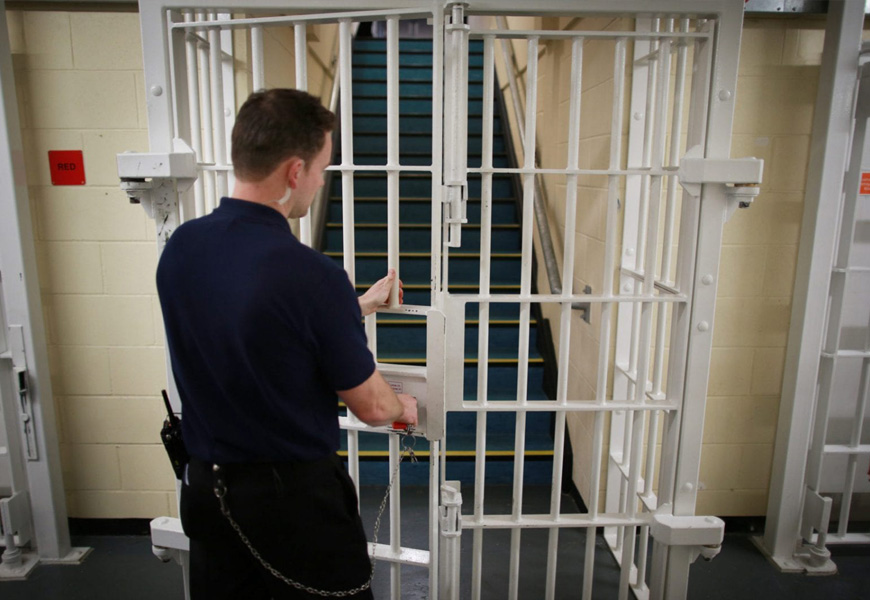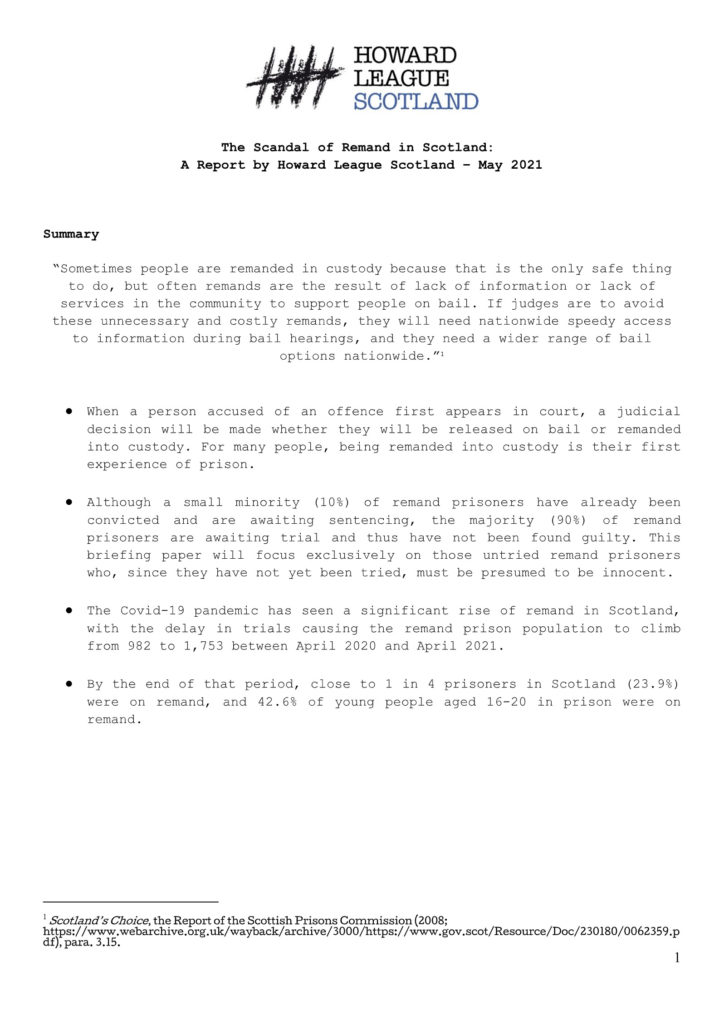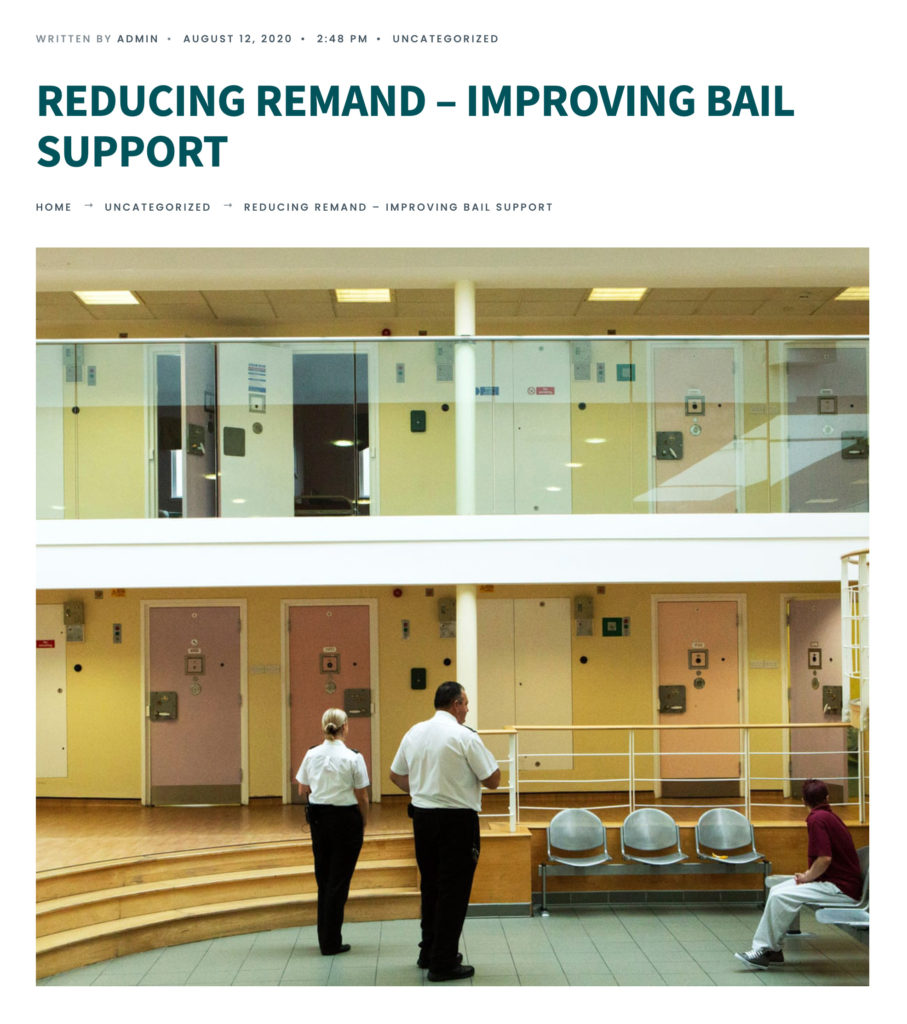Policy Officer, Community Justice
The use of remand continues to be an issue in Scotland and Glasgow city, and this has become more acute during 2020-21. The remand population in Scottish prison rose by a third during 2020-21 and this has been compounded by delays in trials. In their report ‘The Scandal of Remand in Scotland’ (May 2021)The Howard League Scotland reported:
“The Covid-19 pandemic has seen a significant rise of remand in Scotland, with the delay in trials causing the remand prison population to climb from 982 to 1,753 between April 2020 and April 2021.”
The majority of people who are remanded have not yet been found guilty of any offence and the impact of being remanded in prison are well documented. The Howard League notes that these are:
“Very like the effects for those serving short-term custodial sentences, impacting their physical and mental health, employment, housing, and family relationships. Additionally, remand causes financial repercussions for the individual if they are subsequently acquitted or receive a non-custodial sentence. These adverse effects are exacerbated during the pandemic by uncertainty about how long detention will last, and the lockdown conditions implemented within prisons.”
Given the delays in trials because of COVID restrictions, the length of time people spend on remand has also increased and there is increasing uncertainty around timescales for people being held on remand.
People who are remanded are also usually not able to attend programmes within the prison or take up a working role within the prison. While these have been reduced for all prisoners during lockdown, the impact of isolation will be more acute for all people in prison during this time.
Speaking about the effects of imprisonment, Nancy Loucks, Chief Executive of charity Families Outside, said:
“Imprisonment fractures families, with younger children particularly sensitive to sudden and traumatic separation from a parent or other family member. A young child will not draw a distinction between custody for remand or sentence – only that they have had their family taken away from them, with consequences as serious as removal from home, school, friends, and placement in care. This Adverse Childhood Experience (ACE) has proven and potentially long-term negative impacts on health and wellbeing.”
In addition to the impact on those remanded, the impact of frequent short-term admission is also felt by Scottish Prison Service. Since 2009-10, the majority of arrivals to custody (=>70% in any given year) were in remand (mainly untried but also convicted awaiting sentence). Therefore, processing these admissions requires significant people resources to manage, which reduces staff capacity to carry out rehabilitative work. Sentenced arrivals account for less than a quarter of all arrivals to Scottish prisons.
Action by the Community Justice Glasgow Partnership to reduce remand – In our 2019-20 Annual Reporter we reported on our collaborative commissioning work that had led to an Improvement Plan for Bail Support, informed by working with our community justice partners – you can CLICK ON THE PICTURE LINK BELOW to read all about the priority focus areas for the Improvement Plan.
This is in place to help reduce the reliance on remand in the city. This has resulted in a Bail Mentoring Service being commissioned from SACRO, which has worked with people throughout this year, tailoring their approach to meet individual need as well as restrictions on face-to-face support. This provides assurances for sentencers that people will be supported in the community if bail is granted, and that the likelihood of attending future court dates is higher. People supported by this service have rated it highly and given individual feedback including:
‘[My mentor] made sure I was ok and checked in on me regularly through phone calls and texts. She let me know when my court dates and times where, and what court number I was in, so I did not forget. Having her support meant that I did not worry about things and was able to concentrate on my day to day tasks.’
‘[My mentor] was very helpful and continued to provide help after me leaving the bail mentoring service.’
‘If I didn’t have their help I really don’t know what I would have done.’
‘[My mentor] and her colleague [my bail officer], have done me proud and I do not know what I would have done without their support. I have achieved more in the last few months than I have all year. I am so glad I agreed to receive support from Sacro and that [said mentor] was my worker.’
‘They helped me to get an appointment for my PIP and helped with my messages and helped me get out the house.’





